Key takeaways:
- Understanding ocean conservation is crucial for the health of our planet and its ecosystems, which directly affects human survival.
- Key threats to ocean health include overfishing, pollution (especially plastic waste), and climate change.
- Effective conservation strategies involve marine protected areas, community-led initiatives, and sustainable fishing practices.
- Individual actions, such as reducing plastic use and participating in clean-ups, can significantly contribute to ocean conservation efforts.
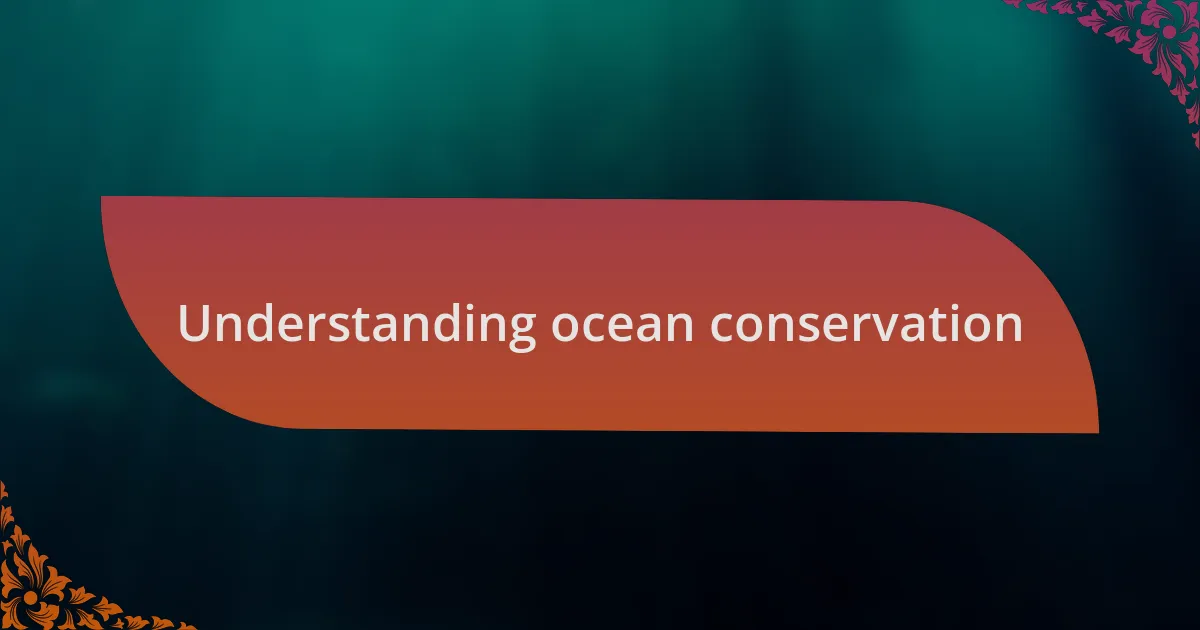
Understanding ocean conservation
Understanding ocean conservation is essential for comprehending the intricate balance of our planet’s ecosystems. For me, the feeling of standing on a beach, watching waves crash onto the shore, instilled a deep sense of responsibility. Have you ever thought about what lies beneath those waves and how vital it is for maintaining life on Earth? Every marine creature plays a role, from the smallest plankton to the largest whales.
I remember my first dive while traveling, where I marveled at the thriving coral reefs, only to later learn that they’re incredibly fragile. It struck me how human activities threaten these vibrant ecosystems, often without our awareness. When I connect my personal experiences to the broader picture, I realize that ocean conservation isn’t just about saving fish or corals; it’s about ensuring a healthier planet for future generations. Isn’t it worth protecting such beauty?
One aspect often overlooked is the emotional connection we can cultivate with the ocean. Each of us has to consider: What would it be like to lose access to this incredible resource? The ocean fosters joy, relaxation, and adventure. By understanding conservation, we learn not only to appreciate these experiences but also to actively participate in protecting our blue planet. It becomes a personal mission, one I feel many others can relate to if they allow themselves to engage deeply.
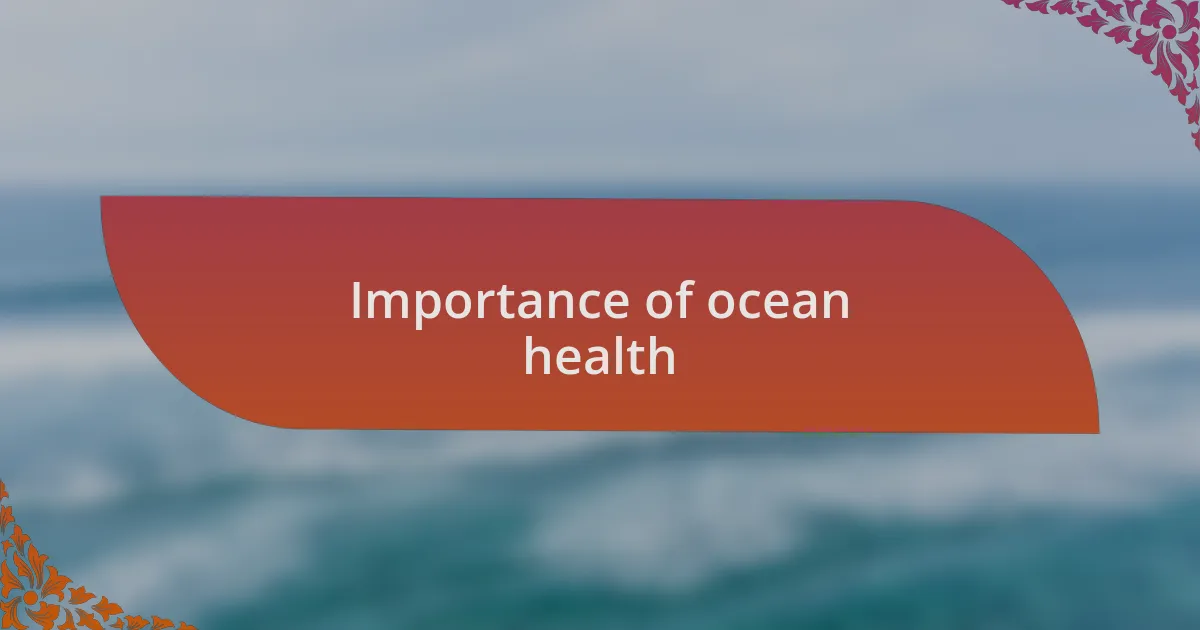
Importance of ocean health
The health of our oceans is crucial to the survival of countless species and, ultimately, ourselves. I often think about the air we breathe—did you know that the ocean produces over half of the oxygen we depend on? When I learned this, it became clear how intertwined our lives are with ocean health, as neglecting it could mean jeopardizing our own existence.
On a recent beach trip, I witnessed the vibrant diversity of marine life and felt an overwhelming sense of awe, but I also noticed stark reminders of pollution—plastic bottles and discarded nets washing ashore. It made me think: how can we enjoy the beauty of the ocean while allowing it to suffer from our waste? These images highlight the urgent need to safeguard ocean health, not just for marine creatures, but for our own well-being as well.
Moreover, healthy oceans play a significant role in regulating our climate. When I learned about the ocean’s capacity to absorb carbon dioxide, it hit home how essential our seas are to combating climate change. Isn’t it fascinating that caring for the ocean can also help address global warming? Protecting marine ecosystems is not just an environmental issue; it’s a collective responsibility that impacts everyone.
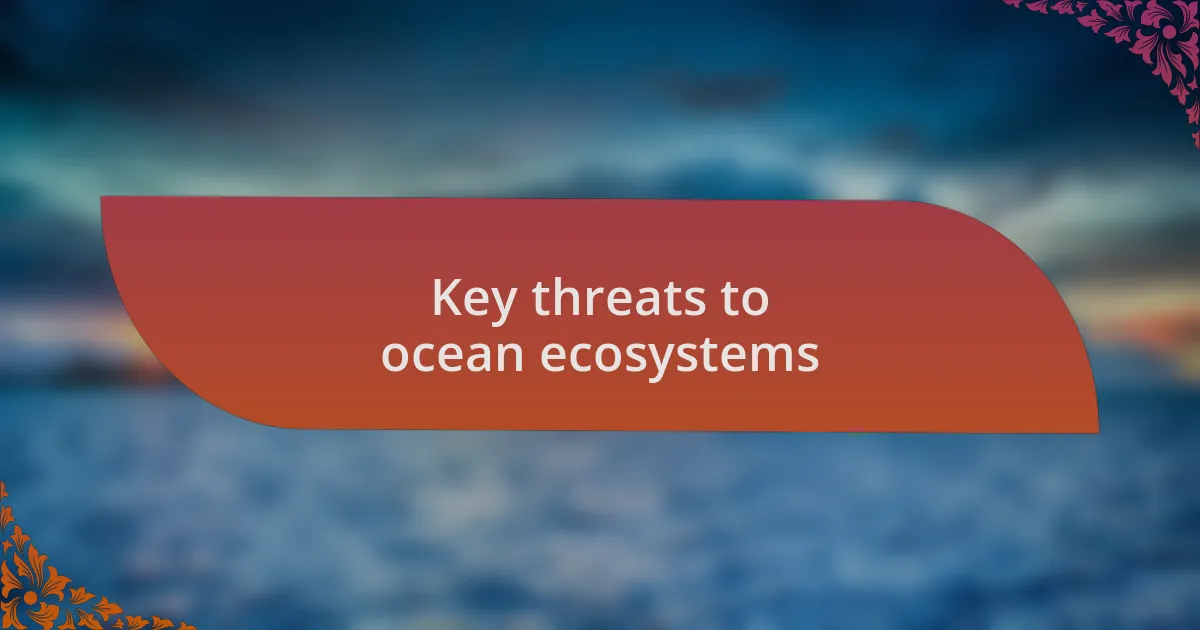
Key threats to ocean ecosystems
When I think about the key threats facing our ocean ecosystems, overfishing stands out prominently. During a visit to a coastal fishing village, I spoke with local fishermen who shared their concerns about declining fish stocks. It was heartbreaking to hear how their livelihoods are affected, yet it also made me wonder: what happens when entire species are pushed to the brink of extinction? The impact on marine biodiversity is staggering, and it raises serious questions about sustainability.
Another critical threat is pollution, particularly plastic waste. On a snorkeling trip, I remember swimming alongside a beautiful coral reef, only to find it marred by stark remnants of human activity—plastic bags and bottles entangled in the corals. Witnessing such a vibrant ecosystem struggling under the weight of our waste was a wake-up call for me. How can we continue to turn a blind eye to the damage we’re causing? Every piece of litter not only harms marine life but also disrupts the delicate balance of these underwater habitats.
Climate change poses an existential threat to ocean ecosystems as well. The rising temperatures and acidification alter marine environments in ways that are often too complex for us to fully understand. I felt a sense of urgency while reading about coral bleaching events and how they jeopardize both sea life and coastal communities. Isn’t it unsettling to think that our actions today could have irreversible effects on the oceans of tomorrow? Recognizing these threats compels us to take action and protect our oceans for future generations.
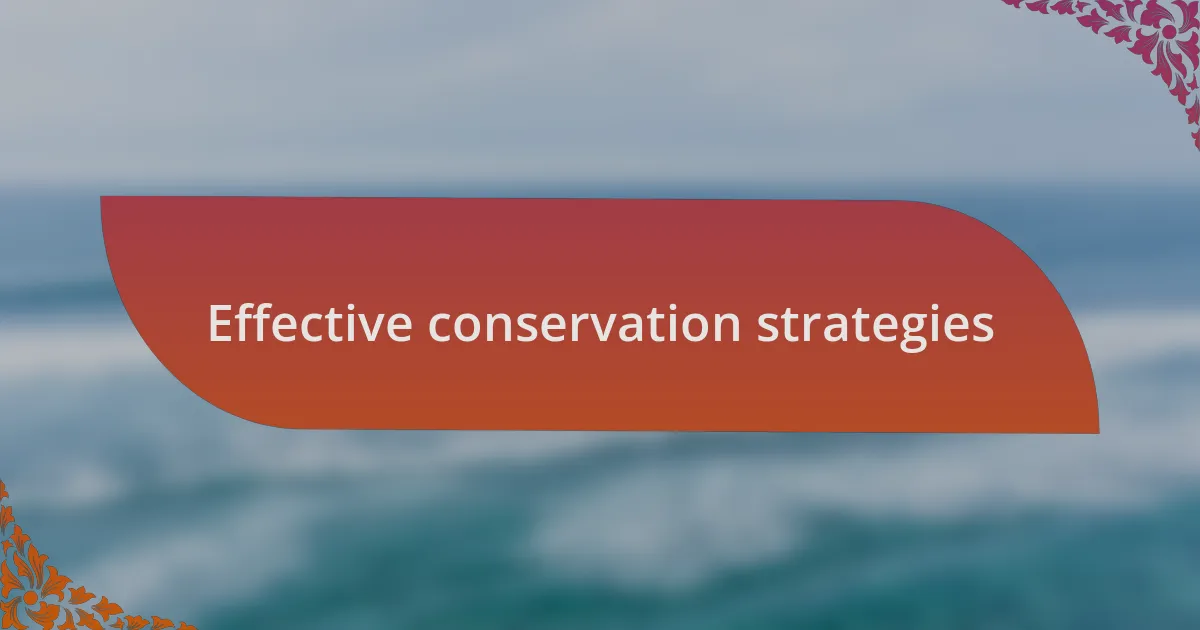
Effective conservation strategies
One effective conservation strategy I’ve encountered is the implementation of marine protected areas (MPAs). During a visit to a newly established MPA, the difference in marine life was astounding. I witnessed firsthand how these zones can serve as safe havens for marine species, allowing ecosystems to recover and thrive. Could it be possible that setting aside more areas could significantly boost fish populations and biodiversity?
Community-led conservation is another approach that resonates deeply with me. While volunteering in a beach cleanup, I met locals who had taken it upon themselves to educate others about sustainable practices. Their passion was contagious, and it made me realize that when people are empowered to take charge of their environment, real change can occur. Isn’t it inspiring to think that grassroots movements can lead to effective conservation outcomes?
Lastly, promoting sustainable fishing practices can create a profound impact. After learning about the benefits of bycatch reduction devices, I reflected on my previous fishing trips and how often we unknowingly harmed other species. Advocating for responsible fishing methods not only helps preserve marine life but also ensures that future generations can enjoy and rely on our oceans. How can we ignore a solution that fosters both ecological balance and economic stability?
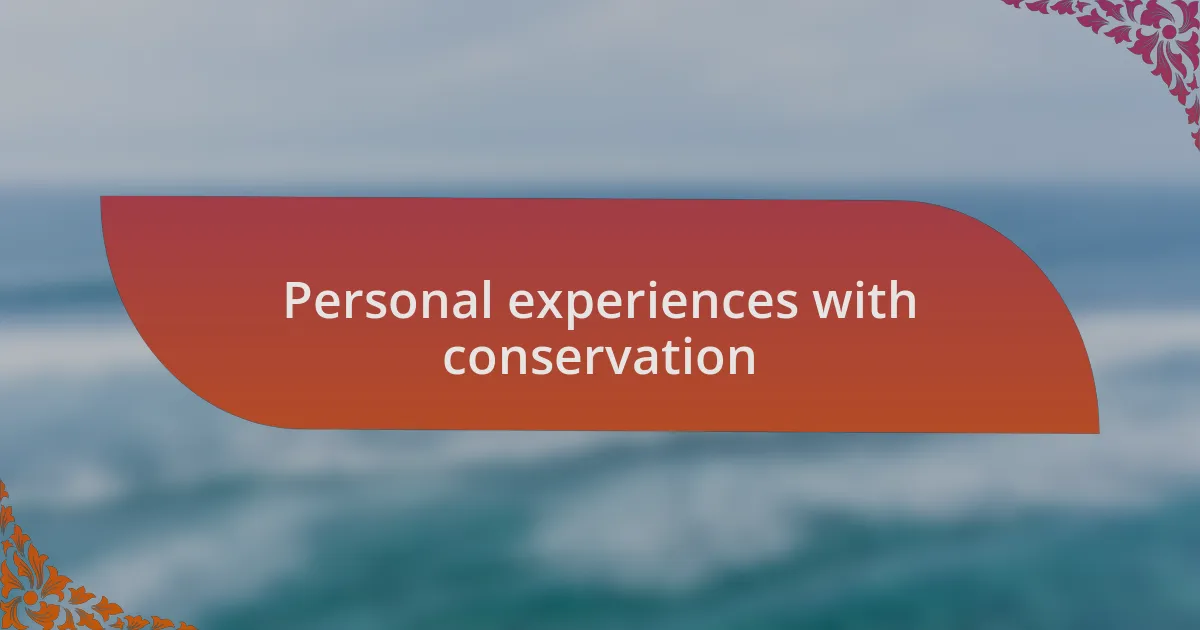
Personal experiences with conservation
One of my most memorable experiences involved participating in a coral reef restoration project. As we carefully transplanted baby corals onto damaged sections of the reef, I felt a deep connection to the ocean. Seeing those tiny fragments flourish in their new home was a powerful reminder of how resilience can prevail when we lend a hand. It made me wonder, how many other ecosystems could thrive if we committed ourselves to such hands-on initiatives?
On another occasion, I joined a group for a citizen science project that monitored local sea turtle populations. The excitement I felt when spotting a nesting turtle was indescribable. It struck me how vital these creatures are to the marine ecosystem and how easily they can be threatened. I often think back to that night, reinforcing my belief that each individual has a role in protecting these magnificent animals. How many more people could be inspired if they experienced the joy of witnessing nature’s miracles?
Participating in marine advocacy campaigns has also influenced my perspective on conservation. I recall attending a rally where passionate speakers shared their visions for ocean protection. The collective energy in the air was infectious, and it made me reflect on the impact of community action. It’s incredible to consider how our voices, when unified, can bring about significant change. Isn’t it fascinating to realize that each of us has the potential to become a catalyst for conservation?
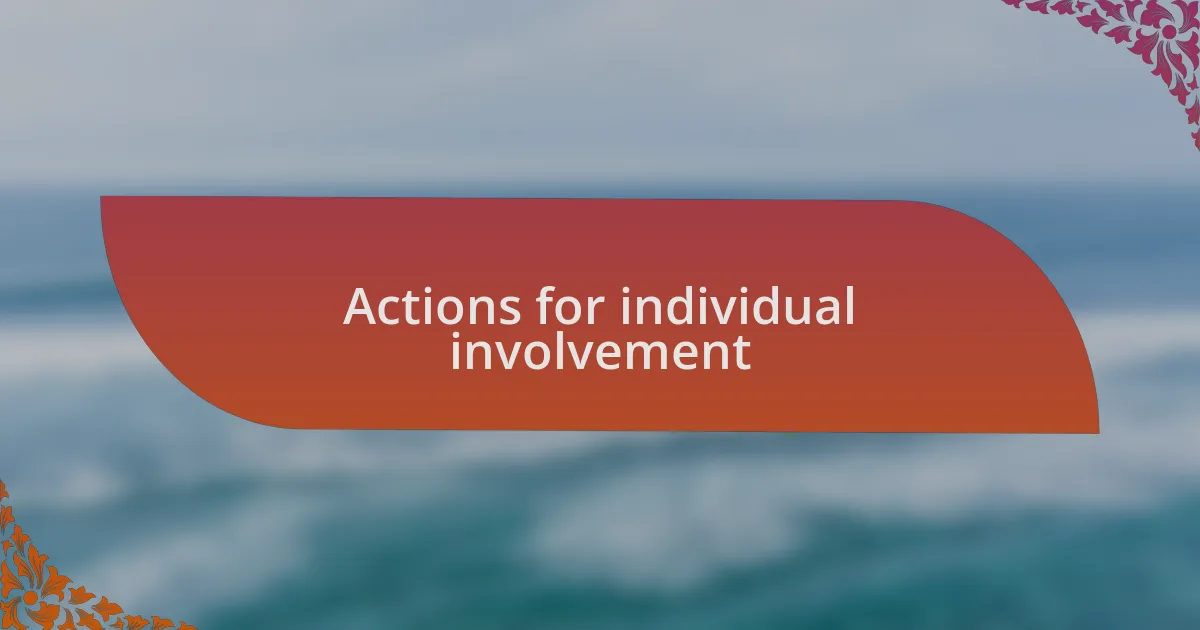
Actions for individual involvement
One simple yet impactful action is reducing single-use plastics in our daily lives. I vividly remember the moment I started bringing my own reusable bags to the grocery store; it felt empowering to know I was making a small difference. Have you ever considered how much plastic waste can be eliminated just by making a small shift like this?
Another way to get involved is by participating in beach clean-up events. I was initially hesitant to join one, thinking it would be a daunting task, but I was pleasantly surprised by the camaraderie among volunteers. As we picked up trash together, I realized how collective efforts can spark a profound sense of community. Have you ever felt the joy of transforming a polluted space into a pristine environment alongside others?
Educating friends and family about ocean conservation is another impactful step. After sharing what I learned about the effects of climate change on marine life, my friends began to engage in conversations that I never would have anticipated. It left me wondering, how often do we underestimate the influence of one enlightening conversation? Each of us has the potential to ignite a passion for conservation in those around us.
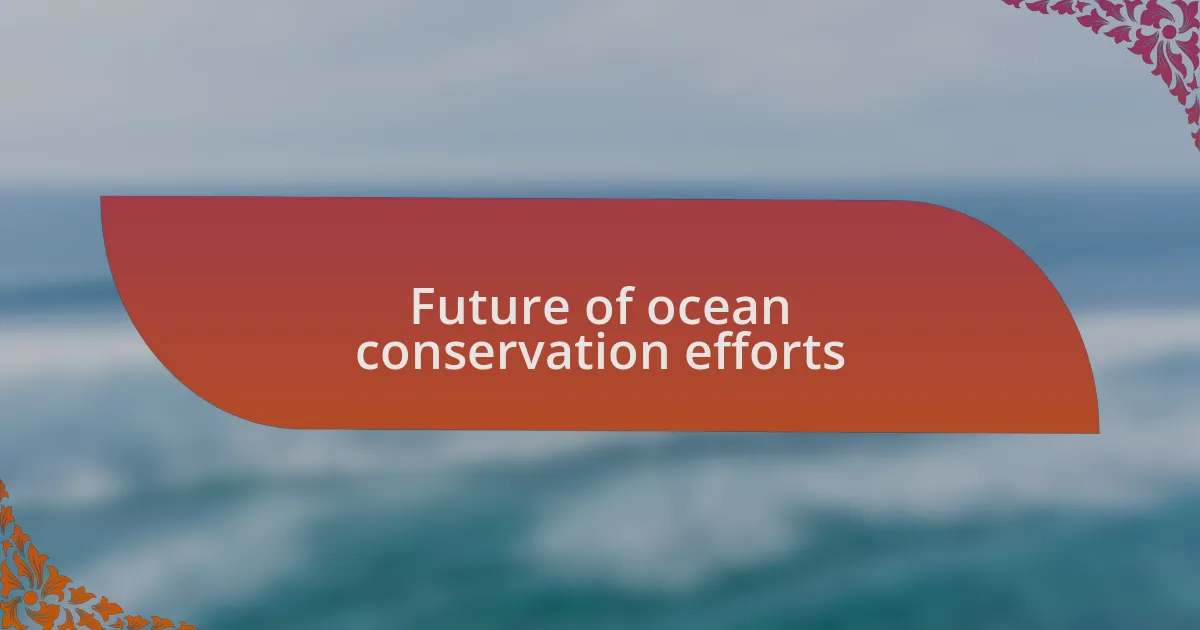
Future of ocean conservation efforts
The future of ocean conservation efforts is inherently tied to innovative technologies and grassroots movements. I recently learned about drone technology being used to monitor marine ecosystems, which dramatically enhances our ability to track changes in coral reefs. Isn’t it fascinating to think about how technology could revolutionize our approach to protecting these vital ecosystems?
Collaboration among countries and organizations is also crucial for effective conservation. I recall a discussion with a marine biologist who emphasized the importance of sharing research and resources across borders. It made me realize just how interconnected our oceans are; when one nation implements sustainable practices, it can have a ripple effect globally. Could we be on the verge of creating a unified front for ocean health?
Furthermore, engaging younger generations is essential for long-term success. I was inspired while volunteering at a local school, where I witnessed students passionately debating ocean issues. Their eagerness to learn and advocate for change was invigorating, making me think—if these young minds are the future, how can we best equip them to protect our oceans? It gives me hope that with the right education and support, they will continue the fight for ocean conservation long after we’re gone.